Dueling Israeli-Palestinian protesters clash at UCLA
Hundreds of pro-Israeli and pro-Palestinian protesters gathered on the campus of University of California, Los Angeles on Sunday, April 28, to exercise their First Amendment rights of assembly and express their feelings on the current Israel-Hamas war.
The Israeli American Council organized an event on UCLA’s Dickson Court, complete with a large projector screen that showed photographs of hostages being held in Gaza by Hamas, as well as Israel-related quotes by historical figures such as Martin Luther King Jr. and John F. Kennedy.
Pro-Palestinian protesters had just days earlier constructed an encampment a few hundred yards away.
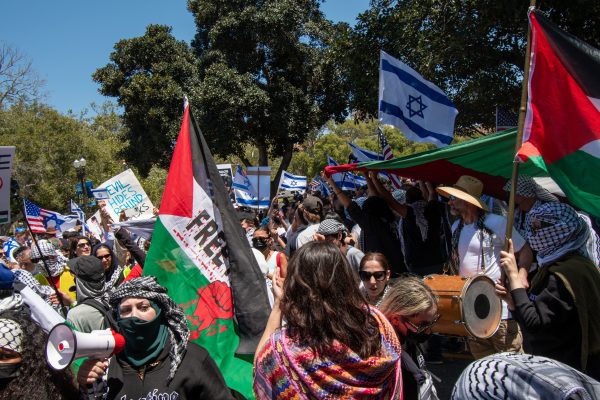
Those same protesters organized a separate protest on the other side of the stage opposite the encampment, which resulted in hundreds of opposing protesters coming face-to-face with each other as private security and UCLA campus police acted as a barrier between the two groups. Tensions were extremely high at times, resulting in heated exchanges and minor physical altercations.
Hamas killed roughly 1,200 people and kidnapped another 240 during their Oct. 7 terrorist attack in Israel, according to the Israeli government. Israel has killed over 30,000 Palestinians in their subsequent war against Hamas, according to the Hamas-run Gaza Health Ministry.
The protests turned physical at times, with vigorous debate and intense feelings occasionally boiling over into pushing and shoving. Even among the heightened tensions, individuals on both sides attempted to keep things calm when others in their respective group began to get too aggressive. Private security officers with Contemporary Services Security placed themselves and their bikes between the dueling protesters. Most pro-Palestinian and pro-Israeli protestors at the event were peaceful and made no attempt to agitate the other group.
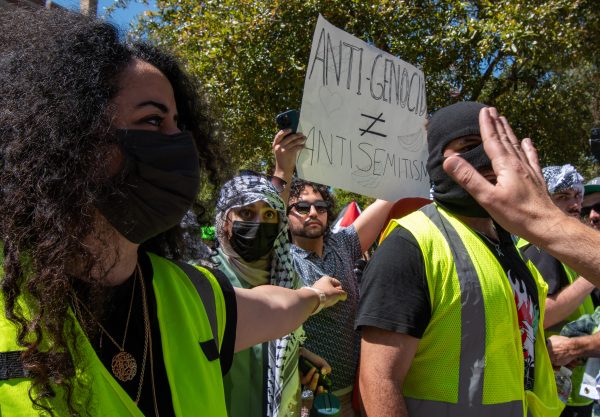
Different areas of the protests had different moods. Most of the pro-Israeli protesters were extremely celebratory, with children, teenagers and adults joyfully dancing and singing on the grassy area surrounding the stage during their event. Other elements of the crowd were more aggressive and agitating, including some who repeatedly attempted to engage pro-Palestinian protesters in dialogue despite continually getting no response.
Most pro-Palestinian protesters stood silently in the face of comments and questions from the pro-Israeli side, but some interactions between the two groups produced profanities, accusations and harsh words from both sides. A few examples of civil dialogue between members of the two groups were seen.
Protestors on both sides used bullhorns, slogans and profanities to express their strong feelings on the issues, including, at times, directly in each others’ faces. Pro-Palestinian protestors shouted slogans like “Free, Free Palestine” and “No Justice, No Peace,” along with the more controversial chants of “Zionists Go Home” and “Long Live The Intifada.”
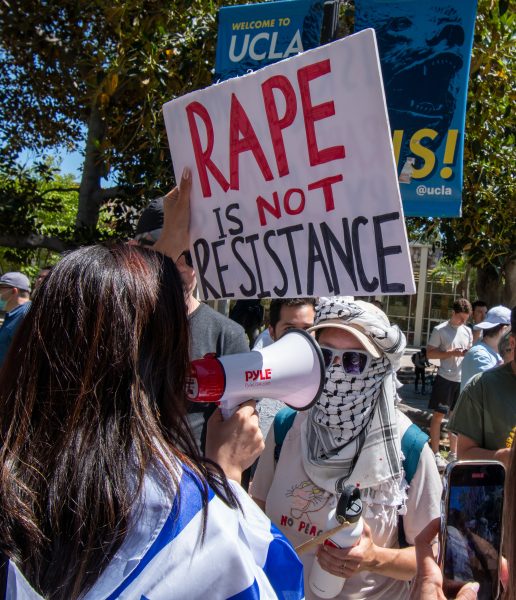
Merriam-Webster Dictionary defines Zionism as “an international movement originally for the establishment of a Jewish national or religious community in Palestine and later for the support of modern Israel.”
The word intifada means uprising in Arabic, but also has historical ties to the first and second intifadas that took place in Gaza and Israel starting in the late 1980s. The first intifada took place from 1987-1993, which resulted in the deaths of hundreds of Palestinian and Israeli civilians and ended with the Oslo accords that expanded Palestinian self-rule in both the Gaza Strip and the West Bank. Hundreds more died on both sides during the second intifada from 2000-2005.
Numerous protesters played drums and banged buckets throughout the hourslong event, as the hundreds of pro-Palestinian protesters were led in chant by supporters with megaphones.
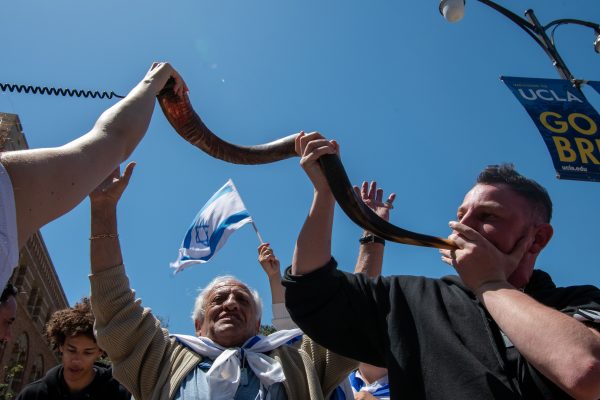
A majority of the pro-Palestinian protesters at the event formed a human chain by linking their arms together, in an effort to prevent people who were not with the pro-Palestinian protest from entering the public space they were protesting in. Most attempted to hide their identity by covering their faces with medical masks, dark glasses and keffiyehs, the traditional Middle Eastern headdress that has come to symbolize the Palestinian community and their social movement for independence.
Most pro-Israeli protesters sang chants of “Bring Them Home,” while some resorted to more inflammatory shouts of “Terrorists” and “F—k Hamas.”
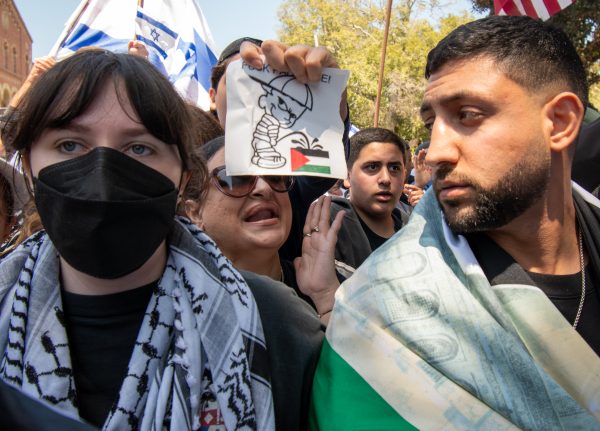
One man holding both an American flag and a “Leftist Love Is Always A Lie” sign shared why he came out to the dueling protests on just a couple hours’ notice.
“To stand for America. To stand for Israel. To stand for truth, God and reality,” said Brent, a pro-Israeli protester from Los Angeles. “It was awesome, except for the terrorists who were here who tried to spoil it.”
A few small items were seen thrown through the air between the dueling sides, including multiple water bottles and one D-sized battery.
Roughly two dozen pro-Palestinian protesters were asked for their perspective on the Israeli-Palestinian conflict and the day’s protests at UCLA. All declined to comment.
Multiple pro-Israeli protesters shared their view that Hamas was to blame for the current state of Israeli-Palestinian affairs, as well as their concerns over what they saw as rising antisemitism and hate speech on college campuses.
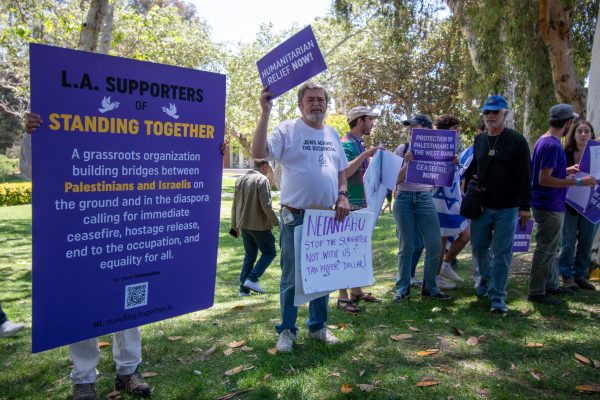
One of the few people attending the event who was not associated with one of two groups was Pini Herman, a Los Angeles member of a nonprofit focused on social and economic progress for both Israelis and Palestinians living in Israel. Roughly a dozen members of his group showed up at the event.
“We’re called Standing Together, American friends of an Israeli group that is led by Palestinians and Israelis, jointly,” Herman said. “[We’re here] to demonstrate support to the Palestinian group, [and show] that there are Jews that care [about them].”
After hours protesting, police ordered both sides to disperse, with the majority of the pro-Palestinian crowd beginning a march across campus.
Asked how he thought the interactions between the two clashing groups of protestors had been throughout the day, Herman warily smiled, as he pointed to a fellow member of his group speaking with some pro-Palestinian protestors.
“Initially, there was some physicality and some pushing,” he said . “[But] at least over here, there’s some sharing of ideas.”
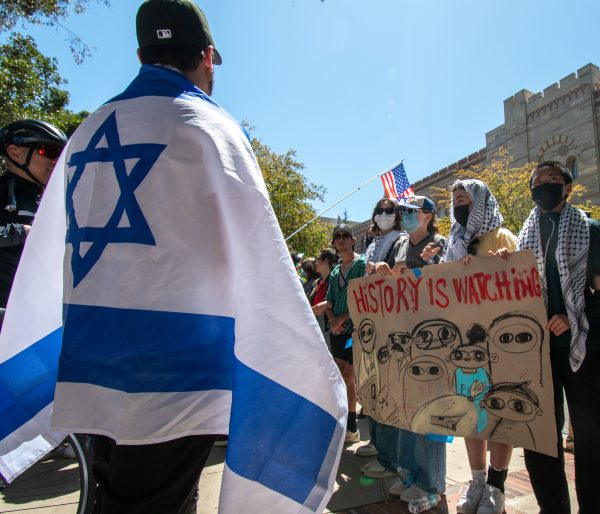
No pro-Palestinian protesters wished to express their views publically.
Sunday’s protests were followed by violence two days later when dozens of pro-Israeli counterprotesters attacked the pro-Palestinian encampment late Tuesday night.
Photos from the Los Angeles Times show metal barriers and blunt objects being used as weapons between the groups, as well as multiple pro-Palestinian protesters being treated for injuries that resulted from the multi-hour scuffle.
Hours later, UCLA Chancellor Gene Block said the events had “shaken our campus to its core and — adding to other abhorrent incidents that we have witnessed and that have circulated on social media over the past several days — further damaged our community’s sense of security.”
Los Angeles Mayor Karen Bass denounced the violence that unfolded on UCLA’s campus as “absolutely abhorrent and inexcusable,” while Gov. Gavin Newsom put out a statement that the “law is clear: The right to free speech does not extend to inciting violence, vandalism, or lawlessness on campus. Those who engage in illegal behavior must be held accountable for their actions — including through criminal prosecution, suspension, or expulsion.”
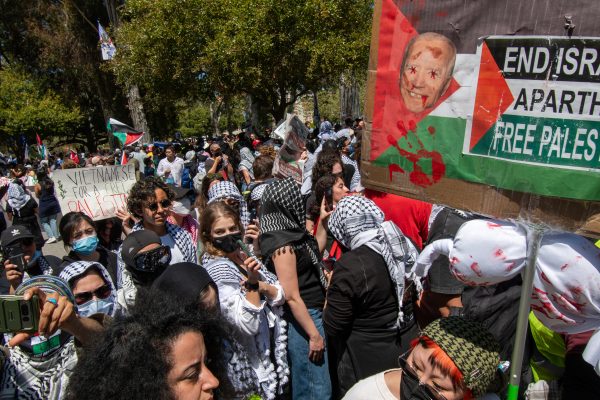
Pro-Palestinian protesters reinforced and expanded their encampment Wednesday following the attack, after which UCLA declared the encampment to be “unlawful and a breach of policy.” Law enforcement arrested roughly 200 protesters who refused to leave the barricaded tent city, with school officials clearing what was left later that day.
Bass issued a statement following the dismantling of the encampment.
“Every student deserves to be safe and live peacefully on their campus. Harassment, vandalism and violence have no place at UCLA or anywhere in our city. My office will continue to coordinate closely with local and state law enforcement, area universities and community leaders to keep campuses safe and peaceful.”
President Joe Biden spoke publicly on the issue of college campus protests Thursday in a speech from the White House.
“We are not an authoritarian nation where we silence people or squash dissent. The American people are heard. But neither are we a lawless country. We’re a civil society, and order must prevail,” he said. “There is no place for hate speech or violence of any kind, whether it’s antisemitism, Islamophobia or discrimination against Arab Americans or Palestinian Americans.”
Latest Daily Sundial
- CSUN holds Black Graduation Ceremony for class of 2024CSUN hosted its Black Graduation Ceremony Sunday, May 12 at the lawn of the University Library, 52 years after the ceremony was introduced to CSUN. The weather was nice with...
- Life as a parent returning to collegeMy two teenage sons motivate, frustrate, inspire and infuriate me. They make me smile and make me, to use their lingo, cringe. They have watched my return to school, beginning...
- Review: Guadagnino’s “Challengers:” Serving up steamy dramaZendaya’s newest film “Challengers” has finally been released after a delay from September 15, 2023, to April 26, 2024. The question is whether this film is a trophy-winning champion or...
- Issue 10 – May 2024Letter from the Editor Staff Highlight Statistics of sentiments: How Asian Americans feel Liberating collectively: Committed to Uplifting Intersectionality Media Querencia – Cantando – Matador Marquee Persistent protection: The inventor...
- Persistent protection: The inventor of the N95 maskThe N95 respirator mask is one of the best, most readily available methods of protecting against airborne illnesses, and its Taiwanese American inventor, Peter Tsai, has been a dedicated engineer...
- Matador Marquee: Asian American filmsMay is special due not only to April showers bringing May flowers, but also due to it being Asian American and Pacific Islander Heritage Month. Asian Americans have a rich...





